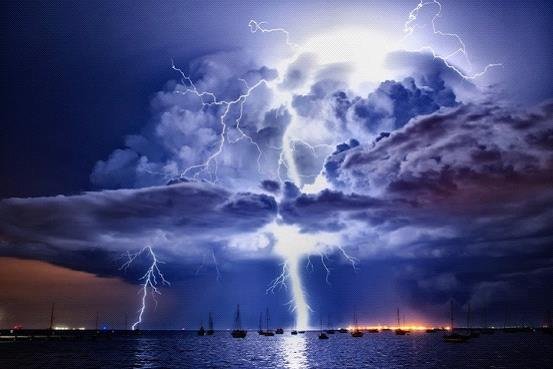(单词翻译:单击)
听力文本
This is Scientific American — 60-Second Science. I'm Christopher Intagliata.
Summertime in India can be unbearably hot. "And the first thing you want, is, get me some clouds, to cool down." Sudip Chakraborty grew up there, in Kolkata. Where he developed a childhood fascination with clouds. "And in like three or four months during monsoon time, it was like, rain, rain, all rain. I like the clouds, the rain, the strength they have. Their importance. It's something like I love them, you know?"
His love of water vapor led him to study clouds, as a climate scientist at UC Davis. Clouds, he says, are built of tiny aerosol particles of dust or pollution from fossil fuel burning that suck up water vapor. "Now these cloud particles with time they combine with each other, and become big. And when they become big, due to gravity, they fall out, and we call it rain."

Chakraborty studied that process in large thunderstorm systems over the tropics, using data from geostationary and circumpolar satellites. And he found that when more aerosols seed the air, like in places with lots of industrial or agricultural pollution, the same amount of water vapor gets absorbed by a larger number of aerosols… meaning tinier-than-usual cloud particle size.
That's important, because "it makes the cloud bigger and larger and stronger and live longer." Three to 24 hours longer. And "it can produce more extreme storms when the rain finally comes." The study is in the Proceedings of the National Academy of Sciences.
A silver lining: he says longer-lasting clouds also reflect more light back into space, which could end up cooling the planet—and at least tap the brakes on climate change.
Thanks for listening Scientific American — 60-Second Science Science. I'm Christopher Intagliata.
参考译文
这里是科学美国人——60秒科学。我是克里斯托弗·因塔利亚塔。
印度的夏天闷热难耐。“你首先想要的就是得到几朵云降温。”苏迪普·查克拉伯蒂在印度加尔各答长大。他孩童时期对云朵十分着迷。“季风时节有三四个月的时间会持续下雨。我喜欢云朵,喜欢雨水,喜欢它们所拥有的力量。它们非常重要。我爱它们,你明白吗?”
他是加州大学戴维斯分校的气候科学家,他对水蒸汽的热爱促使他去研究云朵。他说,云是由尘埃中的气溶胶或化石燃料燃烧排放出的污染物吸收水蒸气而形成。“随着时间的推移,这些云粒子彼此结合,然后开始变大。当它们变大后,由于重力作用,它们开始降落,我们称之为雨。”
查克拉伯蒂研利用同步卫星和极地卫星收集的数据,在热带地区的大型雷暴系统中研究了这一过程。他发现,在更多的气溶胶悬浮在空气中时,在工业污染和农业污染严重的地方,等量的水蒸气会被更多的气溶胶所吸收,也就是说云粒子大小比平常更细小。
这一点至关重要,因为“它会让云的体积变大、力量变强、持续时间更长”。持续时间增加3至24个小时。另外,“在降水来临时,它可以带来更强的风暴”。这项研究发表在《美国国家科学院院刊》上。
一线希望:他表示,持续时间更长的云朵也会将更多的光反射回太空,这可能最终会使地球降温。至少可以在气候变化问题上踩下刹车。
谢谢大家收听科学美国人——60秒科学。我是克里斯托弗·因塔利亚塔。
译文为可可英语翻译,未经授权请勿转载!
重点讲解
重点讲解:
1. cool down (使)变凉;(使)冷却;(使)降温;
例句:Steam condenses into water when cooling down.
蒸汽冷却时凝结成水。
2. due to 由于;因为;
例句:Due to bad cold she spent the entire day in bed.
她因重感冒在床上躺了一整天。
3. fall out 掉落;脱落;
例句:I give my purse a shake, and a coin fall out.
我摇了一下钱包,掉出一枚硬币。
4. end up 最终;结果;到头来;
例句:By the time we're done, we'll end up gutting the whole kitchen.
等做完了这一切,整个厨房就等于被拆空了。


